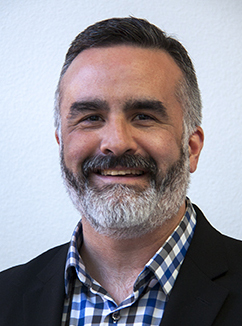Posted 10:21 a.m. Friday, April 21, 2017

Professor Grider will discuss the influence of race, gender, technology and labor on maritime working-class identity in the 19th century Pacific.
 UW-La Crosse History Professor John Grider.[/caption]
Grider’s book synopsis:
Sailors built a maritime community and culture in the Atlantic from the sixteenth to the nineteenth century that promoted masculinity and ethnic and racial tolerance among seamen. During the nineteenth century, sailors from the Atlantic encountered Pacific Islanders and Asians who quickly sought to enter the maritime labor community aboard foreign vessels. New to the maritime world developed in the Atlantic, Pacific peoples brought their own cultural values and masculine identities onto ships that did not always mesh well with traditional maritime customs and work habits. Some Pacific peoples fit well into the maritime community and readily adopted maritime identities and customs. Other Pacific peoples did not find acceptance aboard foreign vessels and rarely assumed traditional maritime identities and customs. Sailors, once tolerant and accepting, became intolerant and abusive to many Pacific peoples. No longer able to rely on traditional identities, sailors looked to racially segregated collective action in order to voice their grievances and obtain concessions from employers. Ultimately, racial segregation harmed seamen by pitting sailors against each other, allowing employers to exploit worker divisiveness.
If you go—
Who: History Department Chair John T. Grider
What: Unveiling of his book, "A Foreign Voyage: Pacific Maritime Labour Identity, 1840-1890"
When: 6:30-7:30 p.m. Thursday, April 27
Where: 3105 Student Union
Admission: None
UW-La Crosse History Professor John Grider.[/caption]
Grider’s book synopsis:
Sailors built a maritime community and culture in the Atlantic from the sixteenth to the nineteenth century that promoted masculinity and ethnic and racial tolerance among seamen. During the nineteenth century, sailors from the Atlantic encountered Pacific Islanders and Asians who quickly sought to enter the maritime labor community aboard foreign vessels. New to the maritime world developed in the Atlantic, Pacific peoples brought their own cultural values and masculine identities onto ships that did not always mesh well with traditional maritime customs and work habits. Some Pacific peoples fit well into the maritime community and readily adopted maritime identities and customs. Other Pacific peoples did not find acceptance aboard foreign vessels and rarely assumed traditional maritime identities and customs. Sailors, once tolerant and accepting, became intolerant and abusive to many Pacific peoples. No longer able to rely on traditional identities, sailors looked to racially segregated collective action in order to voice their grievances and obtain concessions from employers. Ultimately, racial segregation harmed seamen by pitting sailors against each other, allowing employers to exploit worker divisiveness.
If you go—
Who: History Department Chair John T. Grider
What: Unveiling of his book, "A Foreign Voyage: Pacific Maritime Labour Identity, 1840-1890"
When: 6:30-7:30 p.m. Thursday, April 27
Where: 3105 Student Union
Admission: None